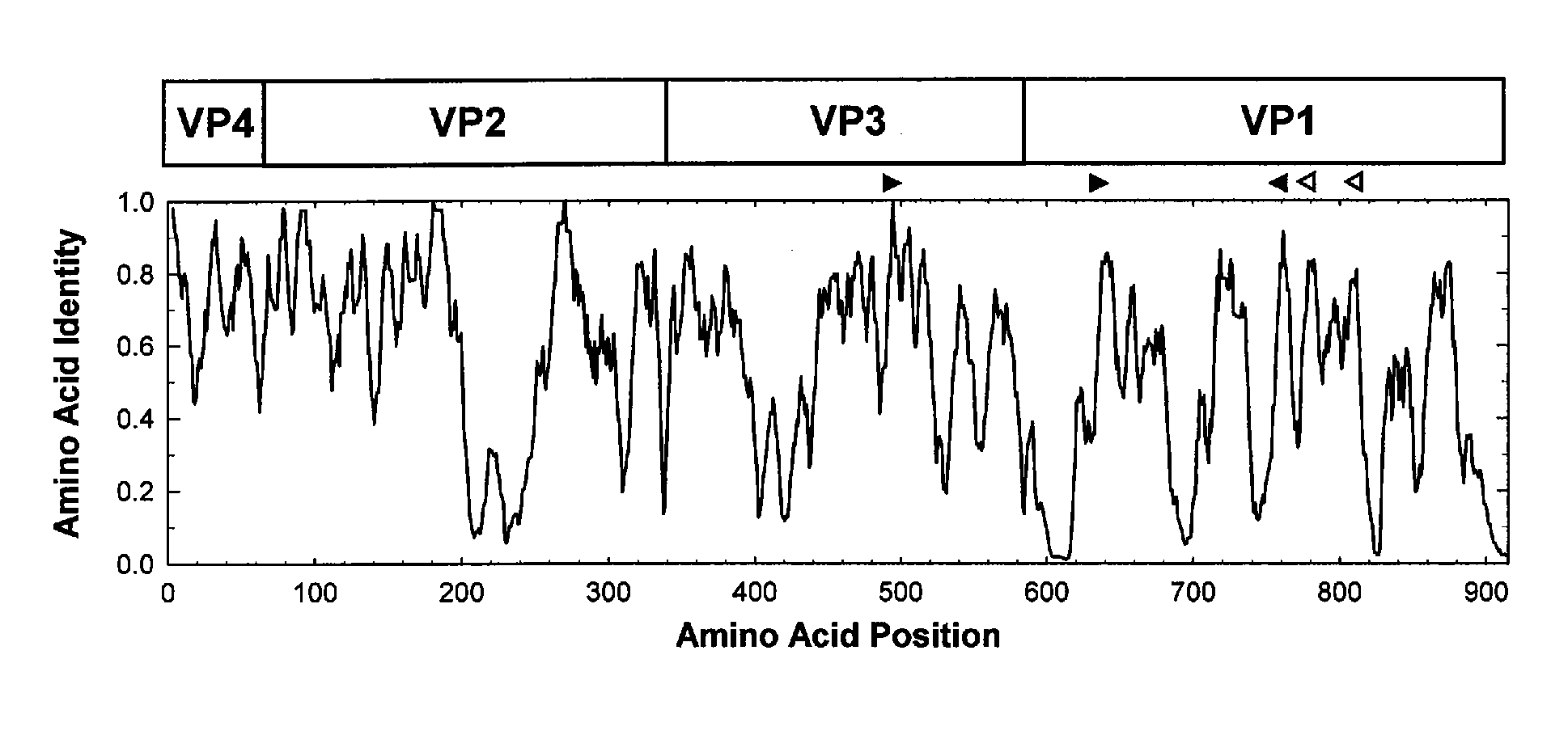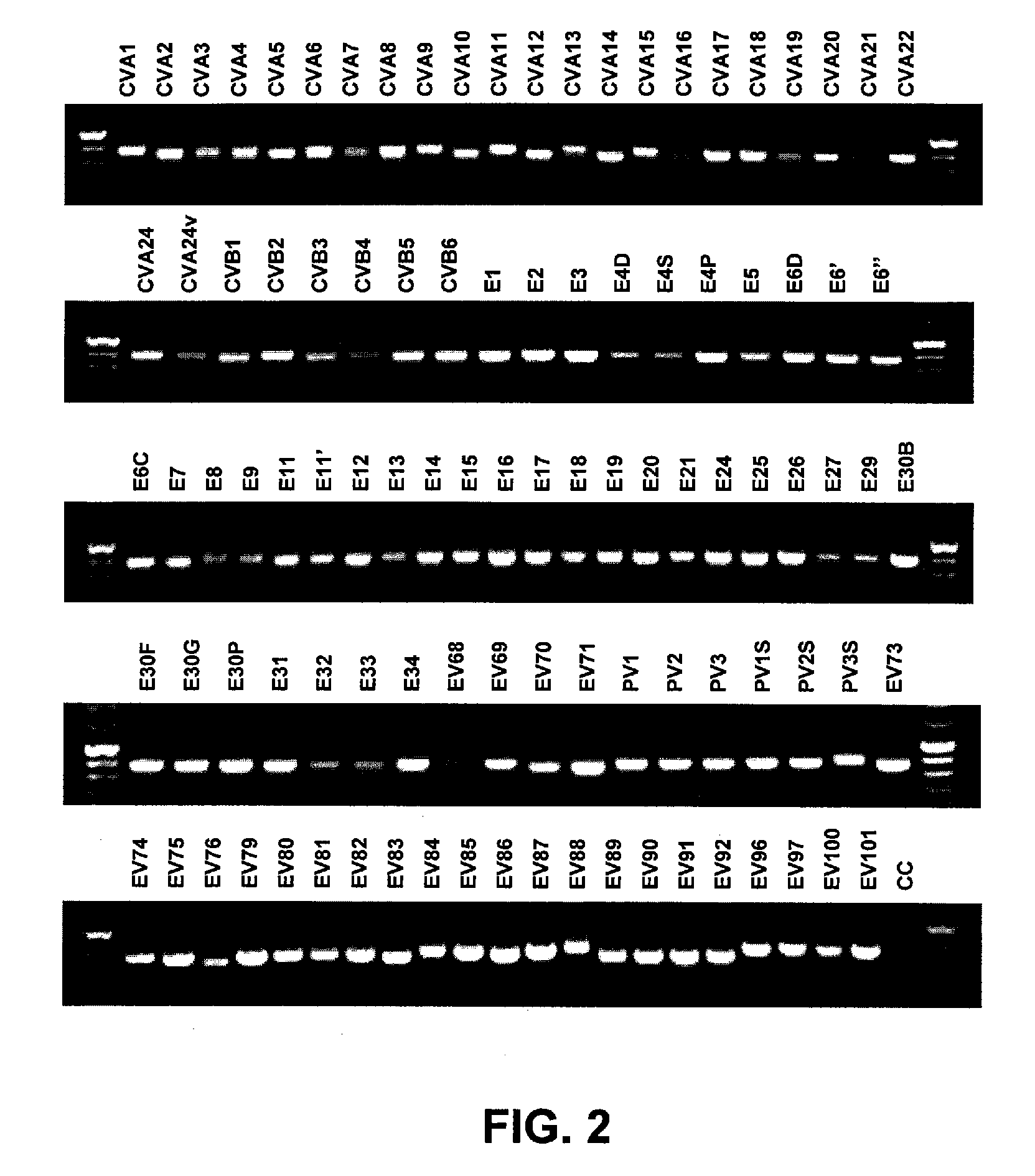Detection and identification of enteroviruses
a technology of enterovirus and detection method, which is applied in the field of detection and identification of enteroviruses, can solve the problems of inability to use the serotype identification method, and inability to identify the serotype, especially from clinical specimens,
- Summary
- Abstract
- Description
- Claims
- Application Information
AI Technical Summary
Benefits of technology
Problems solved by technology
Method used
Image
Examples
example 1
Primer Design and Construction
[0097] This example describes the design and construction of primers for amplification and identification of EVs, particularly EVs in clinical specimens.
[0098] Consensus degenerate primers for the cDNA and PCR1 steps were designed from conserved amino acid motifs in the aligned capsid sequences of the 64 EV serotype prototype strains (Table 1; FIG. 1). The four cDNA primers (AN32, AN33, AN34, and AN35) were designed to anneal to conserved sites downstream of the reverse PCR primer; these sites encode the motifs, WQT (AN32, SEQ ID NO: 1), WQS (AN33, SEQ ID NO: 2 and AN35, SEQ ID NO: 4), and YDG (AN34, SEQ ID NO: 3) (Table 2; FIG. 1). PCR1 forward primer 224 (SEQ ID NO: 5) was designed to target the site in VP3 encoding the highly conserved motif AMLGTH(I / L / M) (SEQ ID NO: 19) (Table 2; FIG. 1), while PCR1 reverse primer 222 (SEQ ID NO: 6) targets a conserved motif M(F / NY)(I / V)PPG(A / G) (SEQ ID NO: 20), near the middle of VP1 (Table 2; FIG. 1; Oberste et ...
example 2
Detection and Identification of Enteroviruses
[0101] This example describes how enterovirus-specific nucleic acids can be amplified and detected using specific primers.
[0102] Nucleic acid from all 64 EV serotype reference strains, 15 additional reference strains for some serotypes and 22 proposed new serotypes (Table 1; 101 strains total) was extracted with the QIAamp Viral RNA Mini Kit (Qiagen, Inc., Valencia, Calif.), which was used according to the manufacturer's instructions. Eluted RNAs were dried passively in a bench top desiccator under vacuum. The dried RNA was resuspended in 16 μl of sterile nuclease-free water and stored at −20° C. until use.
[0103] Synthesis of cDNA was carried out in a 10 μl reaction containing 5 μl of RNA, 100 mM each dNTP (Amersham Biosciences, Piscataway, N.J.), 2 μl of 5× reaction buffer (Invitrogen, Carlsbad, Calif.), 0.01 M dithiothreitol (DTT), 1 pmol each cDNA primer (AN32 (SEQ ID NO: 1), AN33 (SEQ ID NO: 2), AN34 (SEQ ID NO: 3), and AN35 (SEQ I...
example 3
Assay Sensitivity
[0106] This example describes the sensitivity of EV detection / identification methods using specific primers to amplify enterovirus-specific nucleic acids.
[0107] Sensitivity was tested by two methods. Sensitivity relative to cell culture infectivity was measured using a titered stock of the EV68 prototype strain, Fermon. Serial 10-fold dilutions of the EV68-Fermon stock were made in Hank's balanced salt solution, and RNA from 100 μl of each dilution was extracted with the QIAamp Viral RNA Mini Kit (Qiagen, Inc., Valencia, Calif.). RNAs representing from 104 cell culture infectious dose 50% endpoint units (CCID50) to 10−3 CCID50 per 5 μl were tested with the VP1 RT-snPCR assay. The VP1 RT-snPCR assay detected RNA extracted from as little as 0.01 CCID50 per 5 μl of EV68-Fermon (FIG. 3A), indicating that the assay is at least 100-fold more sensitive than cell culture (since 1 CCID50 defines the cell culture endpoint).
[0108] Absolute sensitivity was measured by using ...
PUM
 Login to View More
Login to View More Abstract
Description
Claims
Application Information
 Login to View More
Login to View More - R&D
- Intellectual Property
- Life Sciences
- Materials
- Tech Scout
- Unparalleled Data Quality
- Higher Quality Content
- 60% Fewer Hallucinations
Browse by: Latest US Patents, China's latest patents, Technical Efficacy Thesaurus, Application Domain, Technology Topic, Popular Technical Reports.
© 2025 PatSnap. All rights reserved.Legal|Privacy policy|Modern Slavery Act Transparency Statement|Sitemap|About US| Contact US: help@patsnap.com



